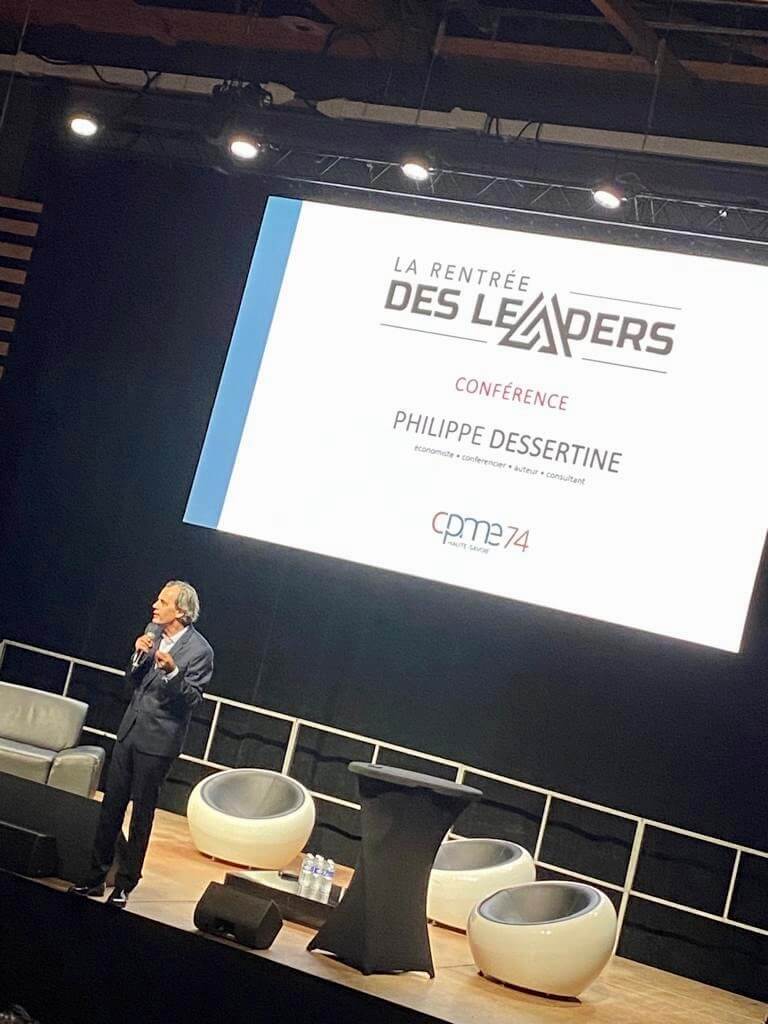At the Rentrée des Leaders event held at Rochexpo on September 7, 2023, Texto was delighted to attend a lecture by Philippe Dessertine. A lecturer at the IAE in Paris, as well as at the Université Paris I Panthéon, this influential economist regularly appears in the media to discuss contemporary economic issues. At the event organized by CPME74, he had the merit of keeping an audience of Haute-Savoie's business leaders and decision-makers enthralled for almost two hours.
Inflation, a worrying phenomenon
Philippe Dessertine kicked off the conference by discussing the inflationary phenomenonHe believes that companies are not sufficiently aware of this. In his view, this is an absolutely major phenomenon, especially as many companies have enjoyed two good years of business and have plenty of cash to spare. In this context, "the biggest danger is that there will be downward price competition, which for some companies would lead to a reduction in margins and potential difficulties".
The economist was particularly insistent on one point: "in times of inflation, we no longer compete by lowering prices." This is all the more true in Haute-Savoie, a département facing competition from Switzerland, particularly in terms of recruitment. "On the contrary, we have to look for ways to improve quality and raise prices to pass on rising costs.
Investing to generate wealth
Remember that inflation is currency devaluation. The more time passes, the greater the loss of wealth and confidence in money. "Inflation is the ordeal of savers, who tend to turn to safe havens such as stone or gold. And yet, to create wealth - and therefore growth - you need to encourage investment. For the banks, there's only one solution: raise interest rates well above inflation, so that investors don't turn away from money.
Climate change in the background
"The real problem of our time is climate change," explains Philippe Dessertine. This problem calls for a new economic model, which, he believes, would enable us to envisage a more sustainable future. new prospects for value creation.
We are currently facing the end of two cycles: the end of Western domination and the end of the cycle associated with the industrial economy. At the beginning of the 19the By the end of the 19th century, the industrial revolution had accompanied demographic growth linked to advances in medicine and a reduction in infant mortality. Technological innovations multiplied, encouraging industrialization. Mainly composed of a young population, society was eager to consume physical products.
Today, however, the situation is different: demographic growth is now linked to the fact that we are dying of old age... And the older humanity gets, the more economic activity is based on services. For the record, global GDP is currently 75% services and 20% industry.
Generative AI, an upheaval in all value chains
Any change in business model requires a scientific revolution. This has been underway for some years now, with algorithms contributing to sustainable development. According to Philippe Dessertine, "we are at a historic moment when science is proposing exactly what humans need: generative artificial intelligence. " As humanity ages, generative AI will free humans to concentrate on other things. A godsend at a time when the whole of the West is complaining about its inability to recruit!
Today, AI appears to be a solution to climate change because, with the capture of DATA non-financial informationcompanies can "demonstrate that their operations are virtuous and that they are capable of proposing an innovative approach to their business. new profitability ". And this is precisely what investors are looking for: financing is now based on the storage of positive sustainability data. Value creation is no longer calculated on the basis of sales, profits and dividends, but through impact measurement. Impact finance is now at the heart of this change in economic model, rebalancing the system between money creation and social responsibility. creation of new wealth.
At this conference, Philippe Dessertine offered Haute-Savoie's managers and decision-makers an opportunity to an innovative and optimistic vision of changing the economic model, highlighting the need to take ecological, social and financial issues into account to ensure a sustainable and prosperous future. Ultimately, his vision could help shape a more balanced economic world and resilient for future generations.

